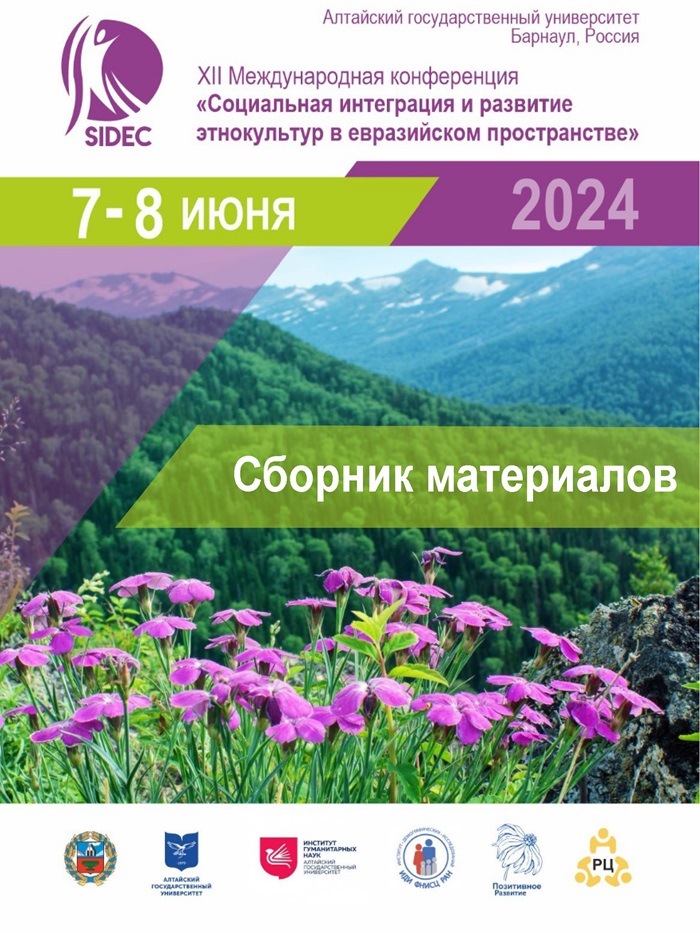INDIGENOUS PEOPLES OF ALTAI UNDER CLIMATE CHANGE: PERCEPTION OF RISKS AND TRANSFORMATION OF TRADITION BASIS OF HUSBANDRY
Main Article Content
Abstract
Climate changes in the Altai mountainous country are considered to be among the most intense and have long-term consequences for the life, health and economic activities of the indigenous peoples. A sociological survey conducted in the mountainous areas of Altai Krai, Altai Republic and Tyva Republic in 2022-2023 (n=2258) showed that the perception of climate risks is heterogeneous, and the ethnic factor correlates with regional natural features of residence. More than one third of the population live in an area with natural risks, more than half of individual ethnic groups face the consequences of natural hazards. Level of adaptation to climate change subjectively has high values, but it is not accompanied by an increase in the level of subjectivity in relation to the management of climate processes.
Downloads
Download data is not yet available.
Article Details
How to Cite
[1]
Omelchenko, D., Maximova, S. and Noyanzina, O. 2023. INDIGENOUS PEOPLES OF ALTAI UNDER CLIMATE CHANGE: PERCEPTION OF RISKS AND TRANSFORMATION OF TRADITION BASIS OF HUSBANDRY. Social Integration and Development of Ethnic Cultures in the Eurasian Space. 1, 13 (Apr. 2023), 233-241.
Section
Статьи
References
1. Климатическая сеть CAN ВЕКЦА. Коренные народы и изменение климата. URL: https://caneecca.org/korennyie-narodyi-i-izmenenie-klimata/ (дата обращения: 3.04.2024).
2. Максимова С.Г., Ноянзина О.Е., Омельченко Д.А. Адаптация населения горных регионов Алтая в условиях изменения климата // Социальная интеграция и развитие этнокультур в евразийском пространстве. 2023. №1(12). С. 153-159.
3. Муди О. Борьба с изменением климата и экологическая устойчивость: коренные народы – часть решения проблемы // Журнал ВОИС. 1/2020. URL: https://www.wipo.int/wipo_magazine/ru/2020/01/article_0007.html (дата обращения: 3.04.2024).
4. Торопов П.А., Алешина М.А., Носенко Г.А., Хромова Т.Е., Никитин С.А. Современная деградация горного оледенения Алтая, ее последствия и возможные причины // Метеорология и гидрология. 2020. №5. С. 118-130.
5. Etchart L. The role of indigenous peoples in combating climate change // Palgrave Communications. 2017. No. 3(1). P. 1-4.
6. Holman I.P., Brown C., Carter T.R., Harrison P.A., Rounsevell M. Improving the representation of adaptation in climate change impact models // Regional Environmental Change. 2017. No. 19. P. 711-721.
7. Salick J., Ross N. Traditional peoples and climate change / Planning for Climate Change. Routledge, 2018. P. 160-166.
8. Schlosberg D. Defining environmental justice: Theories, movements, and nature. OUP Oxford, 2007.
9. Schlosberg D., Collins, L.B. From environmental to climate justice: climate change and the discourse of environmental justice // Wiley Interdisciplinary Reviews: Climate Change. 2014. No. 5(3). P. 359-374.
10. Sobrevila, C. The role of indigenous peoples in biodiversity conservation: The natural but often forgotten partners. The World Bank, 2008. P.1-102.
11. Williams T., Hardison P. Culture, law, risk and governance: contexts of traditional knowledge in climate change adaptation / Climate change and indigenous peoples in the United States: Impacts, experiences and actions. Cham: Springer International Publishing, 2013. P. 23-26.
2. Максимова С.Г., Ноянзина О.Е., Омельченко Д.А. Адаптация населения горных регионов Алтая в условиях изменения климата // Социальная интеграция и развитие этнокультур в евразийском пространстве. 2023. №1(12). С. 153-159.
3. Муди О. Борьба с изменением климата и экологическая устойчивость: коренные народы – часть решения проблемы // Журнал ВОИС. 1/2020. URL: https://www.wipo.int/wipo_magazine/ru/2020/01/article_0007.html (дата обращения: 3.04.2024).
4. Торопов П.А., Алешина М.А., Носенко Г.А., Хромова Т.Е., Никитин С.А. Современная деградация горного оледенения Алтая, ее последствия и возможные причины // Метеорология и гидрология. 2020. №5. С. 118-130.
5. Etchart L. The role of indigenous peoples in combating climate change // Palgrave Communications. 2017. No. 3(1). P. 1-4.
6. Holman I.P., Brown C., Carter T.R., Harrison P.A., Rounsevell M. Improving the representation of adaptation in climate change impact models // Regional Environmental Change. 2017. No. 19. P. 711-721.
7. Salick J., Ross N. Traditional peoples and climate change / Planning for Climate Change. Routledge, 2018. P. 160-166.
8. Schlosberg D. Defining environmental justice: Theories, movements, and nature. OUP Oxford, 2007.
9. Schlosberg D., Collins, L.B. From environmental to climate justice: climate change and the discourse of environmental justice // Wiley Interdisciplinary Reviews: Climate Change. 2014. No. 5(3). P. 359-374.
10. Sobrevila, C. The role of indigenous peoples in biodiversity conservation: The natural but often forgotten partners. The World Bank, 2008. P.1-102.
11. Williams T., Hardison P. Culture, law, risk and governance: contexts of traditional knowledge in climate change adaptation / Climate change and indigenous peoples in the United States: Impacts, experiences and actions. Cham: Springer International Publishing, 2013. P. 23-26.

